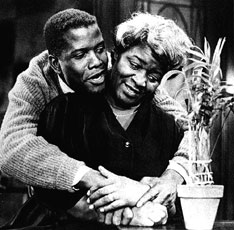By Jay Yaws/reporter

They call him Mr. Tibbs.
Born prematurely Feb. 20, 1927, while his mother was en route from the Bahamas to Miami, Sidney Poitier would become the first black actor to win a lead acting Oscar, in 1963 for Lillies of the Field.
Poitier’s film debut was in 1950s No Way Out, playing the role of a surgeon who has to operate on an avid racist.
His breakthrough role, however, came in 1955. At 27, he played a high school student in the film Blackboard Jungle, opposite Glenn Ford. This performance garnered Poitier critical acclaim and brought more roles his way.
In 1958, Poitier starred alongside Tony Curtis in The Defiant Ones, which earned both men an Oscar nomination for Best Actor.
While two leads getting nods in the same category for the same film is a rare occurrence, this marked the first time a black man received an Oscar nomination.
After receiving acclaim for The Defiant Ones, Poitier acted in Raisin in the Sun on Broadway in 1959 and in turn starred in the film adaptation in 1961.
He made history for the second time in five years when he was nominated for and won the Best Actor award for Lilies.
The film, which received four additional Oscar nominations, featured Poitier as Homer Smith, a construction worker who helps European nuns build a church in the middle of the desert.
1967 brought two of Poitier’s most famous films. The first, Guess Who’s Coming to Dinner, was a milestone film for its depiction of racial relations and prejudices.
In the film, Poitier plays a successful young doctor who meets a woman, played by Katharine Houghton, and goes home to meet her family.
Her parents, played by Katharine Hepburn and Spencer Tracy, object, based almost solely on his race.
The second 1967 film that brought Poitier attention was In the Heat of the Night. The film, about a Pennsylvania police detective who investigates a murder in a racist Mississippi town, introduced Poitier’s most memorable character, Detective Virgil Tibbs.
Tibbs, passing through Sparta, Miss., after visiting his mother, gets mistaken by the town’s police chief as the perpetrator of a recent murder. After being treated harshly and enduring racist comments from the chief, played by Rod Steiger, Poitier delivers a line that has achieved classic status. When asked what people call a “black boy like you” back home, he replies, “They call me Mister Tibbs.”
In the Heat of the Night spawned two sequels and a television series and earned Rod Steiger an Oscar for his performance.
Poitier has tried his hand at directing a handful of films, the most famous being the Richard Pryor/Gene Wilder vehicle Stir Crazy. Up until 2000’s Scary Movie, Stir Crazy was the highest grossing film directed by a black man.
In 1974, Poitier was appointed Knight Commander of the Order of the British Empire. Having citizenship in the Bahamas, a British Commonwealth realm, Poitier was eligible for knighthood and bears the title Sir Sidney Poitier, which he does not use.
In recent years, Poitier has taken fewer roles, having last acted in the 2001 TV movie The Last Brickmaker in America.
Poitier was not the first black performer to receive Oscar recognition. Hattie McDaniel made history in 1940 when she won Best Supporting Actress for Gone with the Wind.
Dorothy Dandridge became the first black actress to be nominated in a lead role, receiving a nomination for Carmen Jones.
James Baskett was technically the first actor to receive an Oscar, garnering an honorary award for his role in Disney’s controversial Song of the South in 1948.
However, Poitier’s Oscar for Lilies of the Field is noteworthy because he was the first black actor to actually win an award.
With actors Morgan Freeman, Jamie Foxx, Halle Berry and Denzel Washington all winning acting Oscars within the past 10 years, Poitier and his colleagues have left a legacy in the filmmaking world.
























